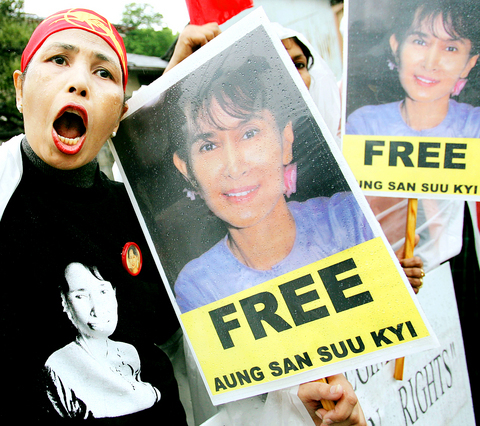Foreign ministers from Asian and European countries were scheduled to start their two-day annual talks yesterday evening in Japan's western Kyoto prefecture on issues such as North Korea's nuclear program and Myanmar's human rights record.
Meetings between Japanese and Chinese foreign ministers, as well as between Japanese and South Korean foreign ministers on the sidelines of the Asia-Europe meeting (ASEM) are also expected to address recent anti-Japan sentiment over handling of its war history.
According to Japanese government officials, the ASEM meeting was to start yesterday evening with the first round of full sessions in which participants are expected to discuss political issues, including how best to reform the UN, prevention of proliferation of weapons of mass destruction, and North Korea.

PHOTO: AFP
Representatives from the 10 members from the Association of Southeast Asian Nations, Japan, China, South Korea and the 25 EU members as well as the European Commission will join the ASEM talks. Japanese Foreign Minister Nobutaka Machimura will chair the meeting.
Ahead of the ASEM meeting, South Korean Foreign Minister Ban Ki-moon and Chinese Foreign Minister Li Zhaoxing met at a Kyoto hotel yesterday and agreed to try to resume six-nation talks as soon as possible and peacefully resolve North Korea's nuclear program.
The six-way talks involve China, Japan, North and South Korea, the US and Russia with the last meeting ending in June of last year unsuccessfully.
Tensions have risen following Sunday's testing of a short-range missile into the Sea of Japan by North Korea. In February, Pyongyang admitted it had nuclear weapons and would no longer participate in talks on the subject.
China and South Korea have urged North Korea not to do anything that would further isolate itself during reports of preparations for an underground nuclear test.
"The ministers said any moves by North Korea that deteriorate the situation further would not help and only further isolate itself," South Korean official Park Joon-woo said.
Meanwhile, EU External Relations Commissioner Benita Ferrero-Waldner is expected to meet with Myanmar's foreign minister, Nyan Win, on the sidelines of the ASEM meeting.
Myanmar joined ASEM last year at a meeting in Vietnam.
The EU official is expected to raise concerns about the Southeast Asian military junta's human rights record and detention of opposition leader Aung San Suu Kyi during the EU-Myanmar talks.
EU foreign ministers last month renewed sanctions for a year against Myanmar, including restricting travel by its officials and preventing investment in the country.
Today, Japanese foreign minister Machimura will meet with Chinese Foreign Minister Li Zhaoxing to discuss how best to improve bilateral relations following anti-Japan rallies in China last month.
Demonstrators in China accused Japan of trying to glorify its wartime history and said they were opposed to Japan's bid for a permanent seat on the UN Security Council.
Machimura's talks with Li will follow Japanese Prime Minister Junichiro Koizumi's meeting with Chinese President Hu Jintao (
Machimura and Li are expected to take up a plan to jointly study bilateral history to bridge the gap over historical interpretations.
ASEM was created in 1996 with the aim of expanding Asian and European ties in a forum without the US.

Alain Robert, known as the "French Spider-Man," praised Alex Honnold as exceptionally well-prepared after the US climber completed a free solo ascent of Taipei 101 yesterday. Robert said Honnold's ascent of the 508m-tall skyscraper in just more than one-and-a-half hours without using safety ropes or equipment was a remarkable achievement. "This is my life," he said in an interview conducted in French, adding that he liked the feeling of being "on the edge of danger." The 63-year-old Frenchman climbed Taipei 101 using ropes in December 2004, taking about four hours to reach the top. On a one-to-10 scale of difficulty, Robert said Taipei 101

Nipah virus infection is to be officially listed as a category 5 notifiable infectious disease in Taiwan in March, while clinical treatment guidelines are being formulated, the Centers for Disease Control (CDC) said yesterday. With Nipah infections being reported in other countries and considering its relatively high fatality rate, the centers on Jan. 16 announced that it would be listed as a notifiable infectious disease to bolster the nation’s systematic early warning system and increase public awareness, the CDC said. Bangladesh reported four fatal cases last year in separate districts, with three linked to raw date palm sap consumption, CDC Epidemic Intelligence

Taiwanese and US defense groups are collaborating to introduce deployable, semi-autonomous manufacturing systems for drones and components in a boost to the nation’s supply chain resilience. Taiwan’s G-Tech Optroelectronics Corp subsidiary GTOC and the US’ Aerkomm Inc on Friday announced an agreement with fellow US-based Firestorm Lab to adopt the latter’s xCell, a technology featuring 3D printers fitted in 6.1m container units. The systems enable aerial platforms and parts to be produced in high volumes from dispersed nodes capable of rapid redeployment, to minimize the risk of enemy strikes and to meet field requirements, they said. Firestorm chief technology officer Ian Muceus said

MORE FALL: An investigation into one of Xi’s key cronies, part of a broader ‘anti-corruption’ drive, indicates that he might have a deep distrust in the military, an expert said China’s latest military purge underscores systemic risks in its shift from collective leadership to sole rule under Chinese President Xi Jinping (習近平), and could disrupt its chain of command and military capabilities, a national security official said yesterday. If decisionmaking within the Chinese Communist Party has become “irrational” under one-man rule, the Taiwan Strait and the regional situation must be approached with extreme caution, given unforeseen risks, they added. The anonymous official made the remarks as China’s Central Military Commission Vice Chairman Zhang Youxia (張又俠) and Joint Staff Department Chief of Staff Liu Zhenli (劉振立) were reportedly being investigated for suspected “serious